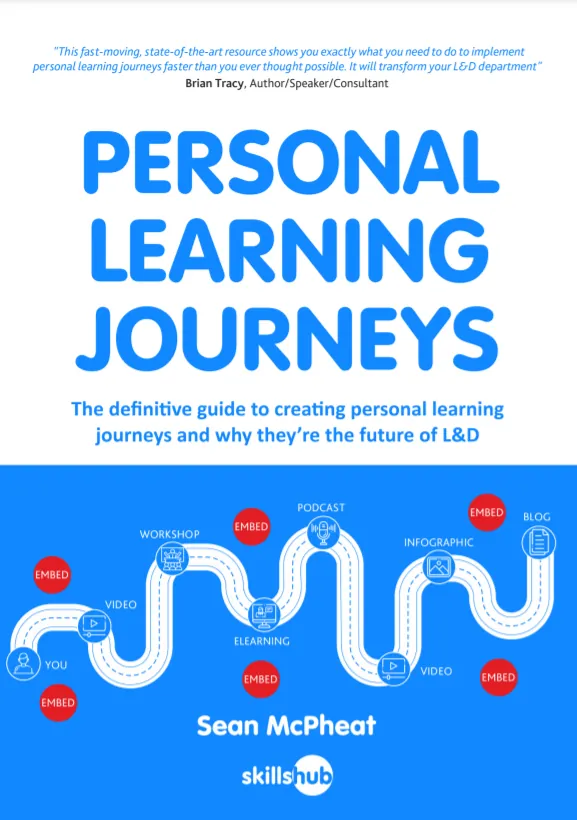While formal training plays an important part in learning and knowledge acquisition, research shows that its actual impact on learning is generally over-rated.
Take this study from Sara Lee, for example, where staff were asked to rate the relative importance of work place learning activities.
Formal training came down the list, accounting for about 20% of work-place learning, whereas informal learning activities accounted for around 80% of the knowledge transfer in the work-place.
It’s clear that companies would benefit from placing a greater emphasis on informal learning.
What is informal learning?
Here are 8 informal learning examples in the workplace:
1) Stretch Assignments
This is a project or task which is assigned to an employee and which is beyond their current competency or experience level.
By pushing them out of their comfort zone employees are ‘stretched’ and forced to adapt to the situation by learning new skills and growing.
A typical stretch assignment for a junior staff member might be first-time management of a volunteer or intern in order to develop maturity and leadership skills.
For a manager, a challenging stretch assignment might be executing a mission-critical company project, or being thrown into a failing department with the goal to turn it around.
These high stakes situations will stretch managers forcing them to learn how to think clearly, manage effectively and make good decisions under pressure.
Jeff Immelt at General Electric wanted to vanquish his leader’s transactional and conservative mindset and have them become risk-tasking, creative, strategic, 21st century thinkers.
A big ask! Immelt achieved this however without formal training.
Rather, he required his business leaders to submit ‘Imagination Breakthrough’ proposals each year that take the company into a new: line of business, geography, area of customer base, and (wait for it) deliver $100 million of incremental growth.
The imagination breakthrough planning and delivery process forced these leaders to develop a more entrepreneurial mind and skill set.
3) Quora
This forum and discussion board stands alone from the typical social network discussion and comments board, because it is a high level informal learning platform.
Quora is a quasi-academic grade, Q and A forum, and informal learning platform, where members pride themselves on asking and answering challenging questions.
There are thousands of highly qualified experts from all functions, (solicitors, scientists, management gurus etc..) resident on Quora, who want to promote their services and skills by demonstrating their know-how by publicly and comprehensively answering challenging questions.
This is great for informal learners who can search and find readily prepared answers, (conveniently ranked in order of quality), to tough questions they may have.
This is a highly effective learning resource and invaluable new addition to the informal learning space.
4) Mentoring
This is a powerful form of informal learning which is mistakenly overlooked by many people.
Sun Microsystems found that employees who were mentored were 20 per cent more likely to get a raise than those who weren’t mentored.
Ironically by setting up a formal mentoring programme you can facilitate informal learning whereby experienced professionals can pass their wisdom and knowledge on to the less experienced.
Mentoring provides an informal learning opportunity for the mentor who, (via reverse mentoring), can learn about new technologies and best practices that prevail within younger generations.

Learn How To Create Personal Learning Journeys For FREE!
5) Networking
This is one of the most effective channels for informal learning as it is a massive opportunity for knowledge sharing, whereby knowledge seekers are connected together with subject experts.
Networking and informal learning can be actively promoted in your organisations by creating breakout spaces and informal meeting spaces and ensuring there is top down commitment to networking.
What will also help is a social media intranet with staff profiles that detail out their respective subject matter expertise and areas of interest along with chat and social discussion functionality.
These mechanisms will help to create a very healthy environment for informal learning via networking.
6) 3Ms famous 15% time is a formal programmes that allows informal learning to occur via blue-sky thinking.
Certain employees in these companies are granted a proportion of their paid working time to invent a new product, service or process for the business.
This requires staff to develop their skills in: research, blue-sky thinking, innovation, pitching, calculated risk-tasking, collaboration and financial modelling.
It will help to develop not only new products but an entrepreneurial skill and mind set.
7) Job Rotation
Experience on the job is a great way to learn new skills.
This is why job rotation – whereby employees work in other related roles – is a great method for focused informal learning.
It is a powerful tool for employee development.
Let’s say your production staff are too internally focused and you want them to develop commercial acumen and customer empathy, you could of course send them on a formal training course or you could rotate them into some outward facing roles where perhaps they deal with customer queries about the product.
The act of working in a customer facing capacity for just a few weeks could help to develop a greater sense of customer awareness in your team.
Job rotation takes many forms, however.
It’s a case of working out what skills you want a staff member to develop and moving them into a role that will force them to acquire those skills.
8) Competitions & Gamification
Children have been playing educational games for years; that’s where they play a game that forces them to both use existing skills and acquire news skills in the process.
Gamification, as a means of informal learning, is now making its way into the work-place.
You don’t always need technology to gamify work, but it helps.
Let’s say you want staff or new starters to read and understand your health and safety and employment regulation documents.
Why not create a quiz/test based on the course content and make a public leader-board of test scores?
You could give some kind of rewards to the best performers and make people retest until they reach the agreed pass mark.
You’ll encourage learning and also make it fun.
Don’t reinvent the wheel here as there are plenty of gamification technologies out there now, (of varying complexities), that allow firms to gamify informal learning with very little effort.
Ready to level up your L&D strategy with the help of an eLearning company? Get in touch with us today!


 While formal training plays an important part in learning and knowledge acquisition,
While formal training plays an important part in learning and knowledge acquisition, 










